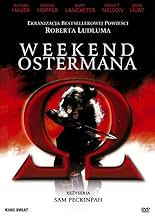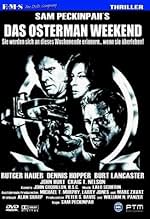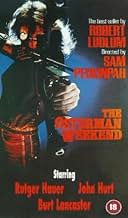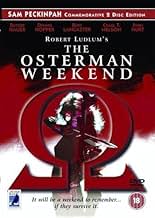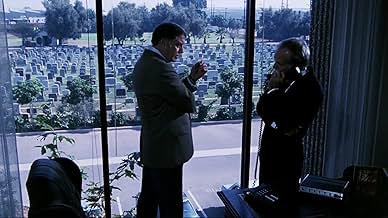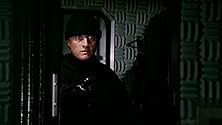Pendant la guerre froide, un journaliste de télévision controversé est sollicité par la C. I. A., on lui demande de persuader certaines de ses connaissances, qui sont des agents soviétiques ... Tout lirePendant la guerre froide, un journaliste de télévision controversé est sollicité par la C. I. A., on lui demande de persuader certaines de ses connaissances, qui sont des agents soviétiques du réseau Omega, de changer de camp.Pendant la guerre froide, un journaliste de télévision controversé est sollicité par la C. I. A., on lui demande de persuader certaines de ses connaissances, qui sont des agents soviétiques du réseau Omega, de changer de camp.
- Réalisation
- Scénario
- Casting principal
- Récompenses
- 2 victoires au total
Avis à la une
Directed by Sam Peckinpah and based on Robert Ludlum's novel of the same name, 'The Osterman Weekend' is a well-acted thriller that rises above its source material, though seems a sad swansong for such a visionary director. Screenwriters Ian Masters and Alan Sharp have injected some much-needed energy and cohesion into Ludlum's convoluted tale, transforming it into a parable about the power of television as a tool of propaganda, instead of the weak meditation on revenge and cold-war paranoia that it originally was.
Unlike in the book, Masters and Sharp use 'The Osterman Weekend' to explore how the media shapes narratives, changes meanings and influences opinions through editing and censorship. Through Tanner's program and the machinations of the CIA, they examine the idea that belief is generated through television- in other words, if people see it on TV, they believe it. While not a particularly profound or original notion, it lends the narrative more weight, as well as providing additional dramatic tension throughout.
This is not to say that 'The Osterman Weekend' should be lauded as a masterpiece, only that it asks more interesting questions than Ludlum's novel, and has a clearer message at its center. Masters and Sharp have not made Ludlum's awkward dialogue any more eloquent, nor has the inclusion of a new character and a new ending helped matters any. The story is still inherently flawed, and bad post-production and editing without Peckinpah's involvement means the finished product is a tad schizophrenic in terms of tone and content- though it is still inarguably easier to follow and more assured than its source material.
'The Osterman Weekend' reunites Peckinpah with cinematographer John Coquillon, whose talents the director had utilized for 'Pat Garrett & Billy the Kid' and 'Straw Dogs'. Coquillon does fine work that fits well within Peckinpah's oeuvre, featuring much of the director's trademark slow-motion violence. By incorporating CCTV footage from multiple monitors, Coquillon shows us different perspectives on events throughout, bolstering Tanner's paranoia and uncertainty about the reality of his situation. Odd angles and lighting are used to heighten this paranoia, though the overall visual aesthetic is one far less stylized than Peckinpah's 'The Wild Bunch', or Coquillon's work on 'Witchfinder General,' adding a sense of authenticity to proceedings.
Also contributing to the sense of paranoia and authenticity are the cast, many of whom deliver nuanced performances that keep audiences unsure of their motivations and loyalties. Rutger Hauer is charismatic and commanding as Tanner, showing a side of his personality he had not yet done through his villainous roles in Hollywood films. Craig T. Nelson does sterling work as Osterman, making him charming, yet morally mysterious. Dennis Hopper fades into the background somewhat, though has some good scenes with Helen Shaver, who is consistently excellent as his drugged-out wife, displaying much emotional perspicuity.
In his case, the great Burt Lancaster seems bored as the director of the CIA, apparently disliking Peckinpah's interpretation of the character and direction. For their parts, Chris Sarandon, Meg Foster and Cassie Yates are competent but generally underused. The real stand-out is John Hurt, who is spellbinding as Fassett, all but stealing the picture. Convincing, conniving and complex, Hurt transforms the one-note caricature of Ludlum's book into the most interesting character in the film, and it's a joy any time he's on screen.
Sam Peckinpah's last film, 'The Osterman Weekend' is far from his best work. Though it is well acted and features fine cinematography, the story leaves a lot to be desired, and post-production work without the involvement of the director leaves the finished product lacking consistency and coherence. Though its indictment of television as a mode of propaganda is still timely, it is not a particularly subtle or profound work in that regard. To conclude, though it has its moments, Bloody Sam deserved a better last hurrah than this.
I gave this film 5/10 simply because I made it through to the end (and Rutger Hauer and John Hurt have done some great stuff), but it was more out of morbid curiosity as to how much more they could butcher the book than for any entertainment value. This was a film that was a product of its time (replete with cheesy music and bad acting) and it hasn't aged well. I'm glad I bought it for 25p because any more and I would've considered it a waste of money.
If it comes up on TV and you have 90 minutes burning a hole in your life, watch it - it isn't dreadful, but it's certainly not great. If you've read the book and are hoping to see it brought to life, or think that you're about to watch another Sam Peckinpah classic, give it a miss, it really isn't worth it.
The central character is a television host played by the typically outstanding Rutger Hauer. One day he is summoned to a meeting with the CIA who instruct him that three of his best friends are really KGB agents and he must help expose them! That would be quite a thing to hear. Hauer is at first approached by John Hurt (who steals this movie), and then by the CIA director played by Burt Lancaster. Once Hauer agrees to expose his friends over the course of a weekend at his place, they inform him he never had a choice but to do so, anyway! Nice bunch of guys at the CIA. Hurt clearly has his own agenda, and it is one of revenge since Lancaster apparently once ordered Hurt's wife killed to protect their operations in Europe. And Hurt does not hesitate putting Hauer and his friends in jeopardy to achieve his goals. Are the friends KGB? I don't think we ever learn for sure if any are, but they do have left-leaning attitudes as well as things to hide. Honestly, by the end of this film it hardly even matters. The film concludes with both Hurt and Lancaster being exposed as crooked on Hauer's TV show, and Hauer attempting to rescue his wife and child from Hurt. Yes the plot is messy, but its based on a novel. Often times there are important things that need to be left out of a novel in order to have time to make it into a movie. That could be one explanation for the impenetrable plot details.
Peckinpah may have been near death, but this is still his film. You can tell with all the pretty women, slow motion action and gun play. Peckinpah claims the studio wanted him to re-cut it after a poor test audience reaction. But by this late stage in his life, it is unclear that he had the facilities to make this one a true winner. Give this film a try if you stumble across it. Or maybe just read the book. 6 0f 10 stars.
The Hound.
John Tanner (Rutger Hauer) is a TV interviewer given an unpleasant assignment by CIA operative Lawrence Fassett (John Hurt): Confront a group of college friends with evidence they are working for a KGB operative named Mikalovich. An array of videotapes provided by Fassett demonstrates their culpability to Tanner. So he sets to work, his home the setting for a prearranged weekend gathering. If it works, a live interview with CIA Director Maxwell Danforth (Burt Lancaster) will be his reward.
For Peckinpah, it was his first film in more than half-a-decade, and a chance to show he was still able to deliver a solid action film well after his gritty early-'70s peak. The CIA comes equipped with cool surveillance equipment and laser-sighted automatics. The Weekend itself, once it gets going, has a nice "Big Chill" vibe with paranoid undertones.
So what goes wrong?
It starts with a 40-minute intro that establishes the premise in clunky fashion. "I'm Cloak, you must be Dagger" Tanner says upon meeting Danforth, whom Lancaster plays with brio but not subtlety. "Being wrong is not nearly as important as not admitting it, not these days," he tells one Company weasel, and acts throughout as the kind of clod you wouldn't put in charge of a shoe store, let alone the CIA.
Then we get to the Weekend itself, with Tanner's college friends taking center stage. Each has their quirks. Osterman (Craig T. Nelson) is a very cool TV producer who describes himself as "a nihilistic anarchist who lives on residuals". Nelson is great fun, though the rest of the group, including Dennis Hopper, gets lost in the mix. Only Helen Shaver's turn as a coked-out floozy stands out, as much for her gratuitous nude scenes as for her entertaining freak outs.
Sappy lite-jazz music by Lalo Schifrin underscores a lack of suspense. Hauer's Dutch accent keeps creeping in like Nastassja Kinski's, and his fragile relationship with his bow-toting wife (Meg Foster) isn't developed any more than those with his once-merry, now-sullen Berkeley chums.
The actual jigsaw puzzle we get here is indifferently assembled and seems at end a few pieces short. At one point Tanner hears Osterman on tape tell his friends "Let's go to our friend John Tanner's house and set him up". Tanner doesn't take this kindly, reasonably enough, yet what Osterman may have meant is never explained. A lot of threads are pulled out this way only to be left floating in the breeze.
John Coquillon's cinematography does capture something the rest of the film flails at, a sense of mystery and foreboding. Hurt's tortured performance as Fassett is nicely underplayed, watching beady-eyed between sips of wine from a china cup as the gears shift into play. And Nelson does crack me up, as in one scene which finds him running for cover.
"It'd be nice if we had weapons!"
"We do!" he is told. "Bows!"
"Bows?" Osterman replies. "That's keen!"
In the end, we get a wrap-up lecture about the pervading influence of television and how this all was, as one character puts it, "just another episode in this snuff soap opera we're all in." Peckinpah supposedly hated this script, only using it because he needed the film, but I think those sad words represent his actual mindset all-too-well. Distrait, somewhat lethargic, and depressing, "The Osterman Weekend" gives us lots of clues but no answers as to where Sam fell off.
However, the problems that Sam Peckinpah was going through at his last stages have noticeably affected the film. The intricate plot is there, but feels stitched together in parts, though that may very well be due the studio demanding re-editing work. The action is at times sloppy with very little of the mesmerizing details of Peckinpah's previous action sequences; a car crash even contains multiple repeats of the same angle and makes some disastrous continuity. The other action scenes are a notch or two better, but still far from what they could have been.
But, at least the plot and its many deceptions keep you guessing, right to the last shot. --- 6/10
BsCDb Classification: 13+ --- violence, sexual content
Le saviez-vous
- AnecdotesDirector Sam Peckinpah was in ill-health throughout the shoot. The long-term toll of his drug and alcohol abuse suggested to many in the production that he was dying. Peckinpah would go off and take opportune naps, but still completed and delivered his initial cut of this movie on time, despite sickness and exhaustion.
- GaffesThe surveillance cameras installed in the Tanner house each have a red light to indicate that they are working. Surely a camera for secret surveillance would not have a visible indicator for all to see.
- Citations
Lawrence Fassett: Think of them as fleas on a dog hit by a car driven by a drunken teenager whose girlfriend just gave him the clap. It will help your sense of perspective.
- Versions alternativesOn the Anchor Bay DVD release there is a rough cut made by Sam Peckinpah which he made showed to the test audience. Because the majority of the audience walked out, from the imfamous sex between Fassett and his wife. The producer wanted Peckinpah to cut the scene out. Once he refuse to made the cuts, he got fired. Other scenes. 1) The sex scene is more extended and shot more wobbly to express how Fassett breaking point for revenge had started. 2) Delete scene of Osterman and Joe talking on the phone about their deal. 3) Extended scene of Virginia flirting with Dick on the phone. 4) There a deleted scene of John Tanner of having an affair with his director Marcia, there wakes up to find her dead. 5) The scene where Tanner and guest are arguing by the dinner table, in the theatrical cut Fassett switches on a Swiss ad, the Peckinpah's cut he has like a big image of Danforth. 6) Alterative ending is juxtapositioned between Tanner searching for his family and the TV studio.
Meilleurs choix
- How long is The Osterman Weekend?Alimenté par Alexa
Détails
Box-office
- Budget
- 6 500 000 $US (estimé)
- Montant brut aux États-Unis et au Canada
- 6 486 797 $US
- Week-end de sortie aux États-Unis et au Canada
- 301 129 $US
- 23 oct. 1983
- Montant brut mondial
- 6 486 797 $US
Contribuer à cette page



